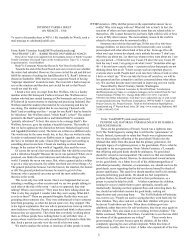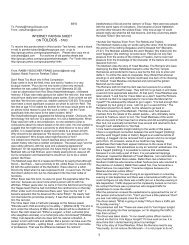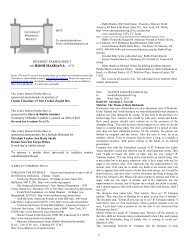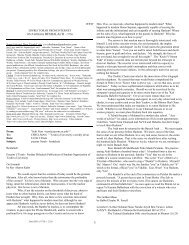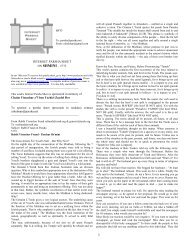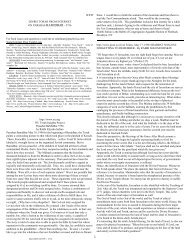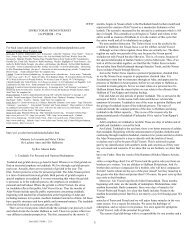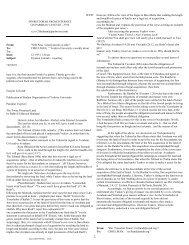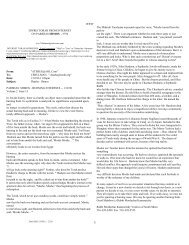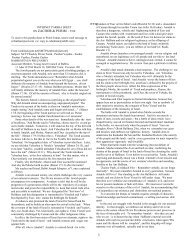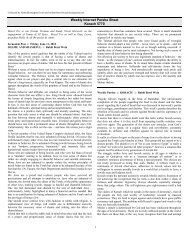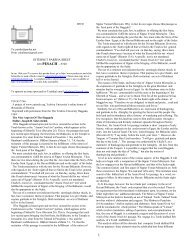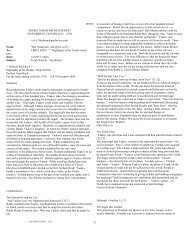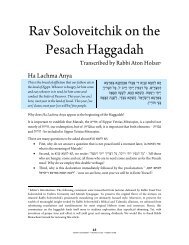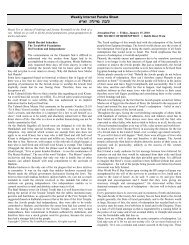ON PARSHAS TAZRIA-METZORA - 5756 - Internet Parsha Sheet
ON PARSHAS TAZRIA-METZORA - 5756 - Internet Parsha Sheet
ON PARSHAS TAZRIA-METZORA - 5756 - Internet Parsha Sheet
You also want an ePaper? Increase the reach of your titles
YUMPU automatically turns print PDFs into web optimized ePapers that Google loves.
"Menachem Leibtag ", " " Chumash shiur...<br />
PARSHAT HASHAVUA PARSHAT <strong>TAZRIA</strong> <strong>METZORA</strong><br />
by Menachem Leibtag<br />
Is 'eight' a magic number in Sefer Vayikra? Or, is it only<br />
coincidental that:<br />
* In <strong>Parsha</strong>t Shmini - the 'eighth day' is chosen for the<br />
dedication of the Mishkan;<br />
* In <strong>Parsha</strong>t Tazria - the 'eighth day' is chosen for the<br />
"brit Milah" of a male child;<br />
* In <strong>Parsha</strong>t Metzora - the 'eighth day' is chosen for the day<br />
on which the cleansed Metzora, Zav, and Zavah bring their<br />
special korbanot;<br />
* In <strong>Parsha</strong>t Emor - the final holiday is "SHIMNI atzeret"?<br />
In last week's shiur, we discussed the biblical significance<br />
of the number 'seven'. This week, we return to Sefer Breishit to<br />
find the biblical significance of the number eight.<br />
INTRODUCTI<strong>ON</strong><br />
From the above examples in Sefer Vayikra, eight appears to<br />
be significant simply because it follows seven:<br />
"Yom Ha'shmini" follows the SEVEN days of the "miluim";<br />
The korbanot on the eighth day of the Metzora and Zav<br />
follow their minimum SEVEN day "tahara" period;<br />
"Shmini Atzeret" follows the SEVEN days of Succot.<br />
Brit Milah, however, seems to be an exception. Although the<br />
mother is "tamei" for the first seven days after her son's birth<br />
(12:2), there does not appear to be any logical connection<br />
between these two laws. Furthermore, the original commandment to<br />
Avraham Avinu concerning brit Milah on the eighth day is not<br />
connected at all to any laws of "tumah" or "tahara". [See Br.<br />
17:7-14.]<br />
Nonetheless, the commandment of Brit Milah - Breishit<br />
chapter 17 - is the FIRST time in Chumash where we find special<br />
importance given to the 'eighth day'. From a cursory reading of<br />
that chapter, the choice of the eighth day appears to be random.<br />
However, a careful textual comparison between that chapter and<br />
earlier chapters in Sefer Breishit will show an intentional<br />
connection between the 'eighth day' and the story of Creation.<br />
A QUICK REVIEW OF SEFER BREISHIT<br />
Recall from our study of Sefer Breishit that God's creation<br />
of the universe is presented in Chumash from two perspectives:<br />
1) "b'shem ELOKIM" (1:1 -2:4) - God's creation of NATURE,<br />
i.e. a structured universe, in SEVEN days ['perek aleph'];<br />
2) "b'shem HAVAYA" (2:5-4:26) - God's special relationship<br />
with Man, i.e. the creation of Gan Eden, and man's<br />
banishment from that environment after he sins.<br />
Owing to the sins of "dor ha'Mabul" (the generation of the<br />
Flood), God decided to destroy His creation and begin again with<br />
Noach. This also took place from both perspectives:<br />
1) b'shem Elokim - BEFORE: 6:9-6:22 / AFTER 9:1-17<br />
2) b'shem Havaya - " 6:5-8; 7:1-5/ " 8:18-21<br />
The children of Noach disperse into seventy nations (10:1-<br />
32). God's intervention in the building of Migdal Bavel, b'shem<br />
Havaya (11:1-10), prevents mankind from uniting for an 'undivine'<br />
purpose. God (again b'shem Havaya) then chooses Avraham to become<br />
the forefather of a special nation that will unite mankind<br />
towards a divine purpose (12:1-16:16).<br />
After commanding him to leave Ur Kasdim and migrate to a<br />
special land, God - b'shem Havaya - promises Avraham several<br />
times that his offspring are destined to become a special nation<br />
in this Promised Land. This promise becomes formalized at Brit<br />
Bein Ha'Btarim (15:1-20), a covenant which not only foresees the<br />
conquest of the Land of Israel by Avraham's offspring, but also<br />
foresees the forging of this nation through bondage in a foreign<br />
Doc#:DS3:217355.1 2331<br />
6<br />
Land.<br />
Interestingly enough, from chapter 11 until chapter 16 in<br />
Sefer Breishit, we find that God speaks to man exclusively b'shem<br />
Havaya. This changes in chapter 17, when God commands Avraham to<br />
perform Brit Milah. In this narrative, God introduces Himself as<br />
"kel sha-dai" and then, for the FIRST time, He speaks to Avraham<br />
Avinu b'shem ELOKIM.<br />
"When Avram was ninety-nine years, God [HAVAYA] appeared to<br />
Avram and said to him: "ANI KEL SHA-DAI", walk before Me<br />
and be blameless. And I will establish My COVENANT between<br />
Me and you... Avram fell on his face, and God [ELOKIM]<br />
spoke to him saying... This is my COVENANT with you..."<br />
(17:1 -4)<br />
In this covenant, given b'shem Elokim, God -<br />
a) changes Avram's name to Avraham;<br />
b) blesses him that he will multiply ("pru u'rvu");<br />
c) promises that he will become a great nation;<br />
d) promises him and his future generations Eretz Canaan;<br />
e) promises to be his God ("l'hiyot l'cha l'ELOKIM");<br />
f) commands him to circumcise his male children, etc.<br />
To appreciate the significance of this special covenant, we<br />
must compare it to the two earlier instances (up until this point<br />
in Chumash) when God speaks to man b'shem Elokim:<br />
(I) After the creation of man on the sixth day (1:27-30);<br />
(II) After the Flood (9:1-17).<br />
(I) On the sixth day, when man is created b'tzelem ELOKIM, God<br />
(b'shem ELOKIM) blesses him that he should:<br />
a) be fruitful and multiply ("pru u'rvu");<br />
b) be master and ruler of the living kingdom;<br />
c) eat from the plants and fruit of the trees.<br />
(II) Some ten generations later, after the Flood, God (b'shem<br />
ELOKIM) blesses Noach and his children in a very similar fashion<br />
(9:1-7), including:<br />
a) to be fruitful and multiply ("pru u'rvu");<br />
b) to be master of the living kingdom;<br />
c) permission to eat living creatures (not only plants);<br />
God's blessing is followed by a special covenant, also given<br />
b'shem Elokim. This covenant, known as "brit ha'keshet" (the<br />
rainbow covenant), reflects the establishment of a special<br />
relationship between God and mankind: a Divine promise to never<br />
again bring about the total destruction of His creation<br />
(9:11,15).<br />
The next time that God speaks to man b'shem Elokim is some<br />
ten generations later, at Brit Milah. Once again we find God<br />
establishing a special covenant with man.<br />
Note the striking textual similarities between "brit Milah"<br />
and "brit ha'keshet":<br />
a) to be fruitful and multiply 9:1 / 17:2,6;<br />
b) "va'ani hi'nei... briti itach(em)..." 9:9 / 17:4;<br />
c) "v'hakimoti et briti..." 9:11 / 17:7;<br />
d) "ha'aterz" // "eretz canaan" 9:13,16,17 / 17:8<br />
e) "ot brit": "ha'milah // ha'keshet" 9:13,17/ 17:12;<br />
Despite these similarities, "brit Milah" constitutes a much<br />
closer relationship. At Brit Milah, the phrase - "l'hiyot lachem<br />
l'Elokim" [to be a God to you"] - is added. This key phrase is<br />
repeated twice, for it emphasizes and defines the purpose of Brit<br />
Milah (read 17:7-8 carefully!).<br />
FROM CREATI<strong>ON</strong> TO CIRCUMCISI<strong>ON</strong><br />
This background can help us appreciate the significance of<br />
brit Milah specifically on the eighth day. Note the progression<br />
of God's relationship with man from the perspective of 'shem<br />
Elokim':<br />
1) The Creation of NATURE in SEVEN days (1:1-2:4);<br />
2) The covenant with Noach after the Flood (9:1-17);



